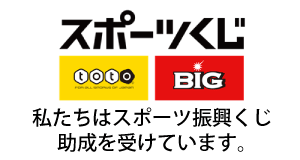SPORTS YOKOHAMA Vol.42:

Nissan Stadium (International Stadium Yokohama)
As everyone knows, the home stadium of Yokohama F-Marinos is the place where the 2002 FIFA World Cup finals were held!
Opened in March 1998 in Shin-Yokohama Park, the largest athletic park in Yokohama City, the stadium is a multi-purpose outdoor sports arena with the country’s highest seating capacity of 72,327 seats. While Nissan Stadium is famous as the venue of the 2002 FIFA World CupTM finals, equally notable is that it is in this stadium that the Japanese national team gained the first victory in a World Cup tournament on June 9 of the same year. When Yokohama F-Marinos played against Albirex Niigata on November 30 of last year as part of the 33 Gameday Games from the J. League Division 1 Season, the stands of the stadium were packed with 62,632 supporters, which is the biggest attendance ever for a J1 League game. This record-breaking feat is still fresh in our minds.
Nissan Stadium hosts not only international games such as the 2002 FIFA World Cup and FIFA Club World Cup championships and large-scale concerts with audiences of up to 70,000 but also national and local annual sports events such as Junior Olympic Track & Field and the citizen-participation “Chibilympic” games held by Japan Agriculture.
The stadium complex also includes the Yokohama Sports Medical Center, which consists of the Departments of Internal Medicine, Orthopedic Surgery and Rehabilitation and offers a variety of health and medical programs for both sports-loving citizens and top athletes. Nissan Stadium is among the candidate sites for the 2019 Rugby World Cup as well as for soccer games in the Tokyo 2020 Olympic Games.
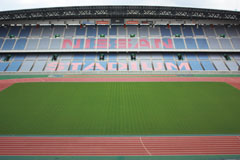
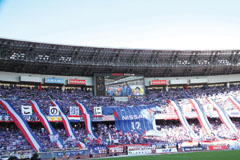
Yokohama Stadium
The home ground of the Yokohama DeNA BayStars boasts easy access and a variety of fascinating eateries!
Yokohama Stadium was built in March 1978 as the first multi-purpose stadium in Japan at a place where the Heiwa Ball Park had been located in Yokohama Park. Since that year, the stadium has been home to the professional baseball team formerly known as the Yokohama Taiyo Whales (the team is now called the Yokohama DeNA BayStars).
The stadium is used not only for professional baseball games but also for amateur baseball events including Kanagawa University Baseball League competitions and the Kanagawa Prefectural qualifying rounds of the All-Japan Senior High School Baseball Championship Tournament. It is Japan’s first baseball stadium to feature a movable pitcher’s mound and used to host American football games as well.
The eateries, redesigned last year, offer plenty of delicious foods that you can enjoy eating while watching the games!
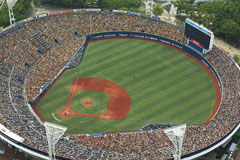
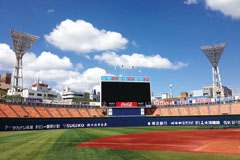
Nippatsu Mitsuzawa Ball Game Ground (Mitsuzawa Park Ball Game Ground)
The “sacred site” for Yokohama FC, this ball game ground is the first one in the history of the J. League to be registered as the home stadium for three clubs in Divisions 1, 2 and 3.
The Nippatsu Mitsuzawa Ball Game Ground was opened as Kanagawa Prefecture hosted the 10th National Athletic Meet in 1955. It was also used as the venue for soccer games during the Tokyo Olympics in 1964. The ground, now receiving a lot of attention as the home stadium for Yokohama F-Marinos in J. League Division 1, Yokohama FC in Division 2 and Yokohama Sports & Culture Club (Y.S.C.C. Yokohama) that will join Division 3 this year, has its stands located close to the ground, allowing spectators to hear the players shout at each other and offering superb sports watching experiences. So fans can enjoy watching the games up close. Not only soccer games but also other events, including Japan Rugby Top League games and finals of the Kanagawa Prefectural tournament of the All-Japan Senior High School Rugby Football Championship, are held in this ground.
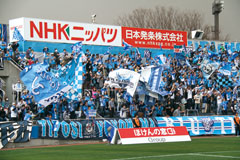
Two Home Arenas of the Yokohama B-Corsairs of Japan’s Professional Basketball League (BJ League)
Yokohama Cultural Gymnasium
The gymnasium was the venue for basketball and volleyball games during the Tokyo Olympics in 1964.
The Yokohama Cultural Gymnasium was opened in 1962. Since then, it has been used to host a vast range of sports and cultural events including professional wrestling shows, boxing matches, sumo tournaments and circuses. Up until 1989, when the Yokohama Arena was completed, the gymnasium remained the most prestigious concert venue in Yokohama. Among the notable events that took place here are the live concerts held by popular rock bands such as BOWY and Red Hot Chili Peppers. It is also in this gymnasium that the Yokohama B-Corsairs clinched a berth in the playoff finals for two straight years – 2012 and 2013 – with a dramatic victory. The international table tennis championship, ITTF World Tour Japan Open 2014 Ogimura Cup, is scheduled to be held this June again, following last year.
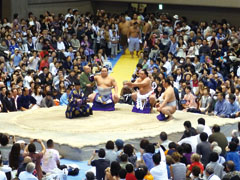
Yokohama International Swimming Pool
The main pool converts into a sports floor in the autumn and winter seasons!
The Yokohama International Swimming Pool was completed in 1998. One remarkable feature of this facility is that its main pool, used for prestigious international events such as the ninth Pan Pacific Swimming Championships in 2002 and the FINA Synchronized Swimming World Cup in 2006, is open to the general public. This main pool, where top swimmers also practice, is used from spring through summer. In the autumn and winter seasons, the cover of the pool is closed, converting it into a sports floor where games of tennis, futsal, handball, basketball and so on are played. Also, as the home arena of the Yokohama B-Corsairs of the BJ League, the place attracts a lot of enthusiastic fans.
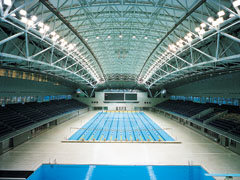
- 特別企画
- 横浜DeNAベイスターズ 中畑清監督 特別インタビュー
- 特集 横浜の誇る大規模スポーツ施設に行こう!
- 横浜の誇る大規模スポーツ施設に行こう!
- 横浜スポーツ施設マップ
- スタンドが観客で包まれる! 選手が躍動する!! スポーツ観戦、最高の舞台が横浜にはある!!!
- スポーツ観戦のワンポイントアドバイス
- Feature
Large-scale Sports Facilities That the City of Yokohama Proudly Provides for Sports Lovers - Large-scale Sports Facilities That the City of Yokohama Proudly Provides for Sports Lovers
- Yokohama City Sports Facility Map
- Stands Packed with Enthusiastic Spectators and Players Moving Around Energetically - Yokohama Offers the Best Environment for Sports Watching!
- Helpful Tips on Sports Watching
- カレンダー・日程
- 横浜スポーツイベントカレンダー
- 横浜プロスポーツチームホームゲーム日程
- スポーツナビゲーター
- 観る、 楽しむ、 学ぶ…
あなたに合ったスポーツとの関わり方、見つけませんか! - お知らせ
- 公益財団法人横浜市体育協会 賛助会員募集のご案内
- 「SPORTSよこはま」の発行日変更 他
- 読者アンケート
- 【SPORTSよこはま】一覧へ

Nissan Stadium (International Stadium Yokohama)
As everyone knows, the home stadium of Yokohama F-Marinos is the place where the 2002 FIFA World Cup finals were held!
Opened in March 1998 in Shin-Yokohama Park, the largest athletic park in Yokohama City, the stadium is a multi-purpose outdoor sports arena with the country’s highest seating capacity of 72,327 seats. While Nissan Stadium is famous as the venue of the 2002 FIFA World CupTM finals, equally notable is that it is in this stadium that the Japanese national team gained the first victory in a World Cup tournament on June 9 of the same year. When Yokohama F-Marinos played against Albirex Niigata on November 30 of last year as part of the 33 Gameday Games from the J. League Division 1 Season, the stands of the stadium were packed with 62,632 supporters, which is the biggest attendance ever for a J1 League game. This record-breaking feat is still fresh in our minds.
Nissan Stadium hosts not only international games such as the 2002 FIFA World Cup and FIFA Club World Cup championships and large-scale concerts with audiences of up to 70,000 but also national and local annual sports events such as Junior Olympic Track & Field and the citizen-participation “Chibilympic” games held by Japan Agriculture.
The stadium complex also includes the Yokohama Sports Medical Center, which consists of the Departments of Internal Medicine, Orthopedic Surgery and Rehabilitation and offers a variety of health and medical programs for both sports-loving citizens and top athletes. Nissan Stadium is among the candidate sites for the 2019 Rugby World Cup as well as for soccer games in the Tokyo 2020 Olympic Games.


Yokohama Stadium
The home ground of the Yokohama DeNA BayStars boasts easy access and a variety of fascinating eateries!
Yokohama Stadium was built in March 1978 as the first multi-purpose stadium in Japan at a place where the Heiwa Ball Park had been located in Yokohama Park. Since that year, the stadium has been home to the professional baseball team formerly known as the Yokohama Taiyo Whales (the team is now called the Yokohama DeNA BayStars).
The stadium is used not only for professional baseball games but also for amateur baseball events including Kanagawa University Baseball League competitions and the Kanagawa Prefectural qualifying rounds of the All-Japan Senior High School Baseball Championship Tournament. It is Japan’s first baseball stadium to feature a movable pitcher’s mound and used to host American football games as well.
The eateries, redesigned last year, offer plenty of delicious foods that you can enjoy eating while watching the games!


Nippatsu Mitsuzawa Ball Game Ground (Mitsuzawa Park Ball Game Ground)
The “sacred site” for Yokohama FC, this ball game ground is the first one in the history of the J. League to be registered as the home stadium for three clubs in Divisions 1, 2 and 3.
The Nippatsu Mitsuzawa Ball Game Ground was opened as Kanagawa Prefecture hosted the 10th National Athletic Meet in 1955. It was also used as the venue for soccer games during the Tokyo Olympics in 1964. The ground, now receiving a lot of attention as the home stadium for Yokohama F-Marinos in J. League Division 1, Yokohama FC in Division 2 and Yokohama Sports & Culture Club (Y.S.C.C. Yokohama) that will join Division 3 this year, has its stands located close to the ground, allowing spectators to hear the players shout at each other and offering superb sports watching experiences. So fans can enjoy watching the games up close. Not only soccer games but also other events, including Japan Rugby Top League games and finals of the Kanagawa Prefectural tournament of the All-Japan Senior High School Rugby Football Championship, are held in this ground.

Two Home Arenas of the Yokohama B-Corsairs of Japan’s Professional Basketball League (BJ League)
Yokohama Cultural Gymnasium
The gymnasium was the venue for basketball and volleyball games during the Tokyo Olympics in 1964.
The Yokohama Cultural Gymnasium was opened in 1962. Since then, it has been used to host a vast range of sports and cultural events including professional wrestling shows, boxing matches, sumo tournaments and circuses. Up until 1989, when the Yokohama Arena was completed, the gymnasium remained the most prestigious concert venue in Yokohama. Among the notable events that took place here are the live concerts held by popular rock bands such as BOWY and Red Hot Chili Peppers. It is also in this gymnasium that the Yokohama B-Corsairs clinched a berth in the playoff finals for two straight years – 2012 and 2013 – with a dramatic victory. The international table tennis championship, ITTF World Tour Japan Open 2014 Ogimura Cup, is scheduled to be held this June again, following last year.

Yokohama International Swimming Pool
The main pool converts into a sports floor in the autumn and winter seasons!
The Yokohama International Swimming Pool was completed in 1998. One remarkable feature of this facility is that its main pool, used for prestigious international events such as the ninth Pan Pacific Swimming Championships in 2002 and the FINA Synchronized Swimming World Cup in 2006, is open to the general public. This main pool, where top swimmers also practice, is used from spring through summer. In the autumn and winter seasons, the cover of the pool is closed, converting it into a sports floor where games of tennis, futsal, handball, basketball and so on are played. Also, as the home arena of the Yokohama B-Corsairs of the BJ League, the place attracts a lot of enthusiastic fans.

 ハマスポ
ハマスポ
 お知らせ&トピックス
お知らせ&トピックス ページトップへ戻る
ページトップへ戻る ページトップへ戻る
ページトップへ戻る
